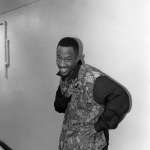“I knew from the jump that it was gonna be a challenge for my listeners’ ear,” Kendrick Lamar tells Rick Rubin about To Pimp a Butterfly. “But if I’m challenging myself in the studio, I want to challenge you as well.”
For GQ Style’s first-ever Holiday issue, Kendrick sat down with the legendary record producer/former co-President of Columbia Records to discuss everything from jazz to how “Alright” became “our generation’s greatest protest song.”
From the press release:
“The cover story features an exclusive addition of annotations made using Genius, including commentary from Eminem, Herbie Hancock, Sam Taylor, Sounwave, DeRay McKesson and more. Kendrick was hosted by venerable producer Rick Rubin at Rubin’s own Shangri La studios in Malibu. The two had never previously met but following their interview they walked directly into the studio to start recording new music.”
Kendrick also touches upon his childhood influences.
“My parents were fairly young in the city of Compton,” he shares. “So the things that they played—you know, that was the hip crowd.”
Read some highlights from the interview below, then watch Rick and Kendrick’s conversation here.
On making music for his audience versus as a means of self-expression:
“I used to consider the listener. But now I’m in a space where if I’m not inspired, I can’t really do the music. I can’t feel it. I put in enough hours to be able to pen a hundred-bar verse on the spot at any given moment. But for me to actually feel an idea, it has to come from me. And a lot of times, I have to block out different needs and wants just for my own selfish reasons. But at the end of the day, it comes out where, whether you like it or not, you know it comes from a real place. It’s gonna feel unapologetic, uncompromising, and it’s gonna feel me.”
On writing “Alright”:
“I was sitting on that record for about six months. The beat’s Pharrell. And between my guy Sam Taylor and Pharrell, they would always be like, ‘Did you do it? When you gonna do it?’ I knew it was a great record—I just was trying to find the space to approach it. I mean, the beat sounds fun, but there’s something else inside of them chords that Pharrell put down that feels like—it can be more of a statement rather than a tune. So with Pharrell and Sam asking me—’Am I gonna rock on it? When I’m gonna rock on it?’—it put the pressure on me to challenge myself. To actually think and focus on something that could be a staple in hip-hop. And eventually, I came across it. Eventually, I found the right words. You know, it was a lot going on, and still, to this day, it’s a lot going on. And I wanted to approach it as more uplifting—but aggressive. Not playing the victim, but still having that ‘We strong,’ you know?”
On bringing clarity and depth to his lyrics:
“The clarity, I got my clarity just studying Eminem when I was a kid. How I got in the studio was all just curiosity. I had a love for the music, but it was curiosity. The day I heard ‘The Marshall Mathers LP,’ I was just like, ‘How does that work? What is he doing? How is he putting his words together like that? What’s the track under that? An ad-lib? What is that?’ And then, ‘Why don’t you go in the studio and see?’ So I do that. Then it became, ‘How’s his words cutting through the beat like that? What is he doing that I’m not doing, now that I’m into it?’ His time is impeccable. When he wants to fall off the beat, it’s impeccable. These are things that, through experience and time, I had to learn.”
SOURCE: GQ | PHOTO CREDIT: Paola Kudacki / GQ Style
<p>Facebook Live Is Loading....</p>





